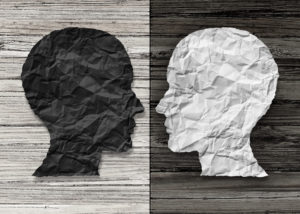Alcoholism (also known as alcohol use disorder or AUD) is common among individuals battling depression. In fact, an estimated 40% of those with AUD are also clinically depressed1. Alcoholism is a progressive disease that can be destructive on its own, but when coupled with mental illness, the effects can be devastating.
Sadly, co-occurring alcohol use disorder and depression often create a spiral of negativity. From personal relationships and finances to work performance and physical health, the two conditions impact all areas of a person’s life if left untreated. Like with alcohol, it can be hard to help someone with drug addiction & depression, so be sure to check out our blog for more articles.
If someone dear to you is struggling with co-occurring disorders, you’ve come to the right place. Northbound Treatment offers a dual diagnosis rehab program in Orange County, and we’re experienced in treating various types of addiction and co-occurring mental illnesses. Find expert guidance on addiction support and how to help someone with depression and alcohol abuse below.
Understanding the Connection Between Depression and Alcohol Abuse
While the prevalence of co-occurring disorders is clear, the link between depression and alcohol abuse is more complex. However, understanding the connection is a critical preliminary step to helping someone get treatment at a rehabilitation center.
The link between depression and addiction is pretty straightforward– those battling depression often self-medicate by drinking alcohol, as the sedative effects of drinking can temporarily numb the symptoms of a mood disorder. Alcohol is a highly addictive substance, and when used as a way to escape psychological turmoil, alcohol dependence can develop quickly. When a person is chemically dependent on alcohol, they have a constant urge to drink and often feel as if they need it to function normally.
In many cases, depression leads a person to alcohol abuse and eventually, alcoholism. But in some situations, it’s the other way around. Excessive alcohol abuse can wreak havoc on an individual’s life and end up causing depression. In any event, both conditions affect the way a person thinks and behaves. When left untreated, the effects of co-occurring substance abuse and mental illness can become rapidly worse.
Knowing the Signs of Clinical Depression and Alcoholism
Feeling sad from time to time is a normal part of the human experience. Also, alcohol is legal and consumed by a majority of adults in the United States. The point is that brief instances of sadness and mild-to-moderate alcohol use aren’t necessarily red flags — but extended periods of grief and excessive drinking can be causes for concern2.
If you think your family member, close friend, or partner may have diagnosable co-occurring conditions, it’s important to be aware of the signs of each disorder. That way, you’ll be able to discern between normal and problematic behaviors and help your loved one get the care they need.
A person with clinical depression might:
- Lose interest in hobbies or activities they used to enjoy
- Become socially isolated
- Appear lethargic or fatigued
- Sleep more than usual or at abnormal hours
- Cry frequently or seem inconsolable
- Experience frequent headaches
- Be generally apathetic
- Eat less or more than usual
- Lose or gain weight
- Become physically unhealthy
- Perform poorly at school or work
- Drink frequently or use drugs
If you observe these signs and behaviors but your loved one hasn’t been diagnosed with clinical depression, the best thing you can do for them is help them seek proper treatment. A clinical psychologist or psychiatrist can diagnose and treat depression. Though if problematic drinking is also at play, dual diagnosis treatment will be the most effective course of action.
A person with alcohol use disorder might:
- Drink to relax or cope with psychological distress
- Be unable to control how much they drink
- Deny or make excuses for their drinking habits
- Attempt to hide their alcohol consumption
- Become socially isolated or withdraw from close friends and family
- Lose interest in hobbies or activities they used to enjoy
- Not want to attend events without drinking alcohol
- Exhibit withdrawal symptoms if they go more than a few hours without alcohol
- Fail to keep up with obligations at work, school, or home
- Face financial or legal issues due to drinking
- Become physically unhealthy
- Become depressed, anxious, or codependent
Many of the signs and characteristics of depression and alcohol abuse overlap. Both disorders can lead to social isolation, work and school troubles, relationship issues, apathy toward previously enjoyable activities, and deteriorating physical health. These signs also demonstrate how depression can result in alcohol abuse, and alcohol abuse can result in depression. To learn more about how depression and substance abuse connect, take a look at our blog.
Helping Someone With Clinical Depression and Alcoholism
Depression and alcohol abuse are serious disorders that should be treated in a clinical setting. Of course, getting your loved one to agree to treatment is often an immense hurdle. If they’ve been denying or making excuses for their drinking habits, confronting a family member about your concerns can be tricky. However, talking to them is the first step in helping them.
Though family interventions can work in some instances, they’re usually reserved as a last-ditch effort after failed attempts to talk one-on-one. When you approach your loved one about their mental health and excessive alcohol consumption, it’s crucial to avoid blaming or shaming them. They should feel as if your concerns come from a place of love and that you genuinely want to help them.
To avoid making them feel guilty, it might help to acknowledge that alcoholism is a mental illness and let them know you don’t like seeing them suffer. Allow them to respond to your concerns with fears or worries of their own. Try not to become overly emotional, inpatient, or raise your voice, as this can make them defensive.
If you’re not sure how to approach the situation, consulting with an interventionist or addiction specialist can be beneficial. We recommend speaking with someone who has experience with interventions for alcohol dependence and co-occurring mental illnesses, like the addiction specialists at Northbound Treatment. They can guide you through a confrontation, letting you know how to prepare and what to expect.
Preparing with the Right Treatment Options
When you talk to your loved one about your concerns, they may admit that they’ve been struggling with alcohol abuse or feeling depressed but that they feel like their situation is helpless. Helplessness is a common feeling among people with depression and AUD. They may want to get better but feel as if they’re a lost cause. That’s why one of the most vital things you do when confronting a loved one is to have treatment options at the ready.
According to research published in the peer-reviewed journal Current Psychiatry Reports, the outcomes of alcoholism and depression can be worse when they co-occur than when they appear individually. Also, if only one condition is treated or one is treated after the other, treatment is often ineffective. However, an integrated approach to treating co-occurring AUD and depression can effectively help individuals overcome both conditions3. In other words, dual diagnosis treatment is essential for those struggling with alcoholism and depression.
With dual diagnosis treatment, a patient’s mental, physical, and emotional state are carefully assessed and taken into account at every stage. Since mental illness and substance abuse are often underlying causes for each other, this approach helps patients identify the root cause (or causes) of their struggles. When alcoholism and depression are treated simultaneously as part of a comprehensive rehab program, they can work to achieve sobriety, find relief from depression, and reduce their risk of relapse and recurrent major depressive episodes.
Northbound’s Approach to Treating Alcoholism and Depression
Here at Northbound Treatment, our mission goes beyond just getting individuals to stop using drugs or alcohol. We’re dedicated to helping our clients live free of substance abuse in both the short- and long-term. That’s why many of our clients participate in our dual diagnosis program, in which they receive treatment for substance abuse and a co-occurring mental health disorder.
With decades of experience in rehabilitation for co-occurring conditions, we’re proud to say Northbound has helped many clients overcome depression and alcoholism. We implement evidence-based therapies to heal the mind, body, and spirit, and we know what works.
Northbound Treatment provides a full continuum of care at our rehab centers here in Orange County. Clients can undergo clinically supervised alcohol detox, then transfer to a secure and supportive residential rehab program. Next, they can transition to outpatient treatment and continue to receive care while living at home. Finally, clients participate in our aftercare program, during which they’ll get ongoing support, accountability, and therapy as needed.
We accept most insurance policies and are an in-network provider for a majority of plans. Additionally, health insurance plans usually cover at least a portion of mental health and substance abuse treatment. We can work with you or your loved one on a flexible payment plan for any remaining out-of-pocket costs.
If your dear friend, family member, or partner is battling AUD and depression, we encourage you to reach out to us. Call Northbound today at (888) 978-8649.
External sources:
1. https://psychcentral.com/lib/alcohol-and-depression/
2. https://medlineplus.gov/alcoholusedisorderaud.html
3. https://www.ncbi.nlm.nih.gov/pmc/articles/PMC3712746/
Author
-

President, CEO & Founder at Northbound Treatment Network
Paul Alexander is the CEO, President & Founder of Northbound Treatment Network in Newport Beach, California. He believes wholeheartedly in transformational leadership, organizational health and effective, fully integrated substance use disorder and mental health treatment. With over 27 years of experience in behavioral healthcare, Paul has extensive knowledge of “in vivo” treatment modalities, clinical development, operations, strategy, marketing and financial planning. He has been widely recognized for his development of collegiate-based residential treatment programs for students in recovery and authored a research study at The University of California confirming this modality’s effectiveness.
Paul’s comprehensive professional experience, willingness to innovate, and emphasis on organizational health are vital factors in Northbound’s continued success. Paul received his Certified Addiction Treatment Specialist training at Saddleback College in Mission Viejo, CA, and was awarded Outstanding Alumni Service Award in 2002. Paul holds a Bachelor of Arts degree in Criminology, Law and Society, Summa Cum Laude, from University of California, Irvine, and a Juris Doctorate degree from Loyola Law School of Los Angeles. Paul currently serves on The National Association of Addiction Treatment Providers (NAATP) board. In addition, he serves on The Family Recovery Foundation board and The CarePossible board in Orange County; both organizations are committed to raising funds for family recovery and treatment for former military personnel. Paul is in recovery himself and lives in Orange County with his wife Silvana and his two young sons, Noah and Dean.










